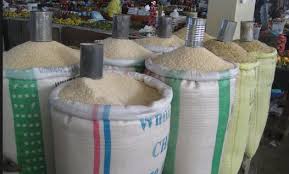Despite concrete and visible interventions of the Central Bank of Nigeria (CBN) via the Anchors Borrowers Programme (ABP) on the rice sub-sector of the Nigerian economy, over 70 per cent of rice in Nigeria markets are foreign or imported.
In a three-week survey on the rice market across the six geopolitical zones in the country, Economic Confidential team observed that foreign rice such as Mama Gold, Royal Stallion, Rice Master, Caprice, Falcon Rice and Basmati are sold alongside Nigerian rice namely: Umza and Fursa Crown from Kano, Mama Happy from Niger, Labana Rice from Kebbi, Olam Rice from Nasarawa, Abakaliki Rice from Ebonyi, Ofada Rice from Ogun State, Swomen Dama from Plateau, Lake Rice of Lagos/Kebbi States among others.
The Nigeria Customs Service (NCS) and the CBN have reacted to the latest report.
Stakeholders in the rice subsector, namely, Rice Farmers Association of Nigeria (RIFAN), Rice Millers Association of Nigeria (RIMAN) and Rice Processors Association of Nigeria(RIPAN) however gave kudos to the apex bank for the timely intervention and banning of rice since 2015, a development that has seen growth in local production of rice and serious saving of foreign exchange.
The stakeholders in separate interviews laid the blame for the inflow of the banned commodity on the doorsteps of the Nigeria Customs Service(NCS), adding that for the federal government to make meaningful impact in its fight against smuggling of the commodity, serious attention must be paid to the various porous borders which the Nigeria Customs Service has the constitutional responsibility to man.
The development is coming almost four years after the federal government banned the importation of the commodity through land, sea and air.
As part of efforts to reach different markets across the six geopolitical zones of the country, the investigative team spread its dragnet to Singer Market Kano; Utako Market, Abuja; Terminus Market Jos; Mile 3 Market Port-Harcourt; , Main Market, Onitsha; Ogbete Market in Enugu, G-Cappa Market, Lagos and Jimeta Main Market – Yola.
On-the-spot checks by this intelligence magazine show the preponderance of foreign rice in these markets by merchants who said that profits coming from foreign rice far out-weigh the local rice which majority of those interviewed believed has more nutritional value than the foreign rice.
The dealers buy local rice at about N13,000 per 50kg bag, while they sell it customers for between N15,500 to N16, 000. The same merchants pay about N11,000 for the smuggled foreign rice and sell to consumers between N17,500 and N19,000 per bag.
Speaking on the disparity between the cost of local rice and smuggled foreign rice, Paul Nwadike, a rice distributor at Ogbete market in Enugu said: “My brother, let me tell you that gains we receive from selling foreign rice are more than the local rice because local rice is more costlier.”
Auwal Mukhtar a merchant in Singer Market Kano said: “There is more market for us in foreign rice because it’s cheaper.”










